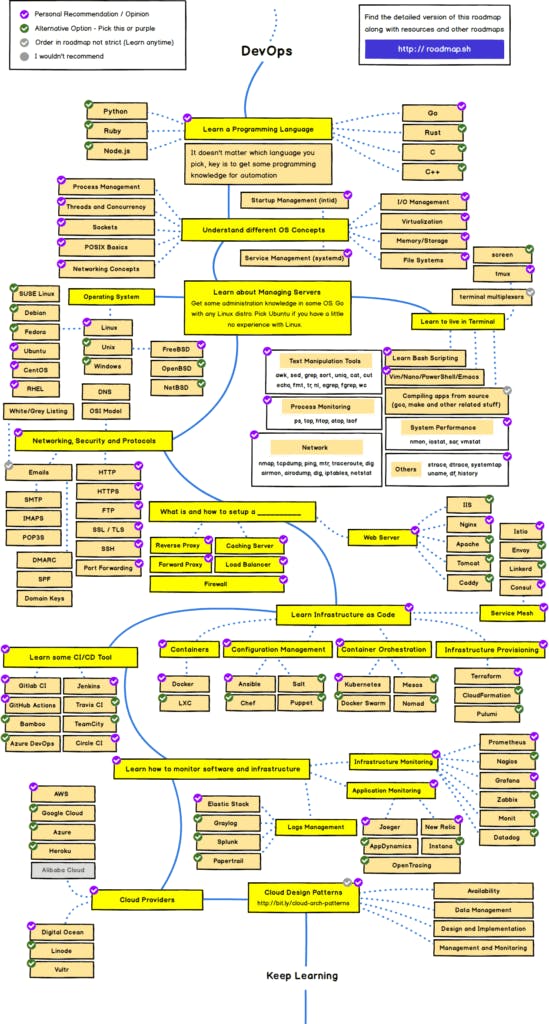Updated: October 16, 2023
The app and software development cycle is typically lengthy, frustrating, and full of unpredictability. To reduce the time and costs associated with development, companies are taking up the help of DevOps Engineers. For those interested in a DevOps career, today I’ll show you how to become a DevOps Engineer and the skillsets required to get started.
Many organizations are moving to DevOps, an ethos that integrates IT professionals and software developers who manage production operations for a smoother, more productive workflow. This means DevOps Engineers are in demand more than ever before. Since 2018, the DevOps Engineer Job listing has been ranked consistently in the top five on Glassdoor’s Best Jobs in America list.
Enable High Velocity Development
Breakaway from the inability to quickly deploy isolated environments of any specification.
If you’re interested in pursuing a career as a DevOps Engineer, we’ve gathered all the required info so you don’t have to, including:
- DevOps Engineer Day to Day Activities
- The path you should follow to becoming a DevOps Engineer
- What sort of degree, training, and courses you should learn
- The time required to become a DevOps Engineer
- The difference between DevOps Engineer and DevOps Architect
- DevOps Engineer Jobs and Expected Salary
DevOps Engineer Day to Day Activities
DevOps is not about asking developers to do some operational tasks so you can get rid of your operations team. Instead, it’s an opportunity for you to encourage the development and operations teams to work together to achieve the same goal. Along with improving the collaboration between these two teams, DevOps helps ensure work is done smoothly and efficiently, and the product’s quality increases to a greater extent.
DevOps Engineers’ day-to-day responsibilities start from gathering all the requirements for development, testing, dev environments, infrastructure deployment, application deployment & monitoring, gathering feedback from the end-user, and implementing those changes. They should spend most of their time researching new technologies that can improve your product’s efficiency and effectiveness. The goal is to implement highly scalable applications and integrate infrastructure builds with application deployment processes.
The day-to-day activities of a DevOps Engineer include:
- Examining the potential use of the software so that users can save data without any problems.
- Keeping all code changes in a single source so that devs can easily modify and test them.
- Keeping an eye on the users’ feedback regarding new releases.
- Creating and designing a better interface that is more automated and intuitive for new users.
- Collaborating and interacting with other team members.
- Working on Automating backlog/tasks and documentation.
- Depending on priority, DevOps Engineers also help by removing bottlenecks and assigning management tasks.
- Keeping themselves up-to-date with the latest technology and news.
The Path to Becoming a DevOps Engineer
DevOps Engineer is one of the most in-demand jobs with no signs of slowing down. In the last 3-4 years, the demand for DevOps Engineers has increased by 40-45%, and the number is rapidly growing. At the same time, DevOps is a challenging job that requires a vast skill set, experience, and in-depth knowledge in the field.
There’s no doubt that DevOps demand will only be increasing. So, if you’re planning to choose DevOps as a career, then you’re on the right track. We will provide you with all the info you need to know regarding how to become a DevOps Engineer from scratch.

Source: https://roadmap.sh/devops
DevOps Engineer Training: Degrees, Certifications, and Technologies to Learn
Technologies DevOps Engineers Need to Learn
- Gradle – Gradle is a reliable DevOps stack tool. It was introduced in 2009 and has been popular since then. Before Gradle, Apache Ant and Maven dominated the market for many years.
- GitGit – This is one of the most popular DevOps tools. GitGit is a distributed SCM (source code management) tool widely used across the software industry.
- Jenkins – It’s the DevOps automation tool that software developers use. Jenkins is an open server CI/CD server tool that allows developers to automate the delivery pipeline’s various phases.
- Bamboo – Is a tool similar to Jenkins. Bamboo is Atlassian’s CI/CD server solution that facilitates developers to automate your delivery process. Unlike Jenkins, Bamboo is a paid tool.
- Docker – Is one of the essential DevOps tools. The rocket was launched in 2013 and is the number one container platform.
- Kubernetes – Kubernetes works well with Docker and its alternatives. You can group your containers into logical units. It’s a container orchestration platform that takes containerization to the next level. The tool was launched in 2015 and was founded by a couple of Google engineers.
- Puppet – This is a cross-platform configuration management platform that allows you to manage your infrastructure as code. Because it automates infrastructure management, you can efficiently deliver software quickly and securely.
- Ansible – Ansible is a simple and easy-to-use tool. It works similar to Puppet and Chef and is a configuration management tool. Through Ansible, you can easily configure your infrastructure and automate deployment.
- Nagios – It’s an open-source, free DevOps monitoring tool. With Nagios, you can easily regulate your infrastructure so that you can fix up the issues. You can also keep records of events, failures, and outages.
- Raygun – It’s an error monitoring and crash reporting platform. Raygun’s most recent product is Application performance monitoring (APM). You can quickly analyze performance issues and track them back to the exact line of code, API call function.
Some other things to include:
- Linux fundamentals and scripting knowledge
- Experience in developing digital pipelines (CI/ CD pipelines)
- Good understanding of concepts like Infrastructure as Code
- Knowledge of cloud service platforms (AWS, GCP, Azure)
DevOps Engineer Degrees & Certifications
- DevOps Foundations (James, Ernest) – is a three-hour video course designed to teach beginners everything about DevOps. Check out more info here!
- DevOps Foundations: Infrastructure as Code (James, Ernest) – it is also a two-hour LinkedIn learning course. It teaches everything about infrastructure automation concepts, with demos illustrating them in everything from Cloudformation to chef.
- DevOps Foundations: Continuous Integration/Continuous Delivery (James, Ernest) – here, James and Ernest will teach you about continuous integration and delivery, with demos in Jenkins, Nexus, and more.
- DevOps Foundations: Lean and Agile (Karthik, Ernest) – you can learn about Lean, Agile, and DevOps at a basic level in this course along with adopting their methods, which will contribute to your success.
- DevOps Foundations: Site Reliability Engineering (James, Ernest) – the “Third Leg” of DevOps along with IaC and CI/CD; this is the “ops” part of ops.
- DevOps Foundations: Monitoring and Observability (Peco, Ernest) – you will learn everything about the DevOps Monitoring feature.
- DevOps Engineer Masters Program: this is a Master’s course organized by Edureka. The Master’s Course will teach you everything about DevOps principles like CI/CD, Continuous Monitoring, and Continuous Delivery, using Puppet tools, Nagios, Chef, Docker, Git & Jenkins. It also contains training on Linux, Python, Docker, AWS DevOps Certification Training, and Splunk. The curriculum has been determined by extensive research on 5000+ job descriptions across the globe. Price $1,000
- Docker Certified Associate: the Docker Certified Associate (DCA) certificate has been designed for Docker practitioners with some relevant experience working with Docker. Price: $195
- Kubernetes Administrator Certification: this exam is conducted to verify your Kubernetes skills. It’s one of the most prestigious certifications. It also uses plenty of labs to adopt a practical approach. Price: $25.27/month
- AWS Certified DevOps Engineer Certification: this test is conducted to test your knowledge in designing distributed systems on the AWS stack. The certification also focuses on important practices like security controls, monitoring, metrics, and logging systems on AWS.
- Microsoft Azure DevOps Engineer Expert: Microsoft offers certification to help DevOps engineers become knowledgeable about operating services in its Azure
- Microsoft also offers cloud services for running and scaling applications quickly. Therefore, it offers an exam that helps DevOps engineers become knowledgeable about running services on its Azure platform. Price: $167
How Much Time Does It Take to Become a DevOps Engineer?
The answer depends on how one is learning and preparing to become a DevOps Engineer. Generally, it can take up to six months to know all the basics. Start learning about the tools that you like the most, and go from there. In a few months, you will get well-versed.
What’s the Difference between a DevOps Engineer & a DevOps Architect?
A DevOps architect is someone who thinks and creates designs.
A DevOps Engineer is pragmatic and thinks along the lines of “How can I get that design (created by the architect and validated by the consultant) implemented and make it work?”
DevOps Engineer Jobs & Expected Salary
The average salary earned by DevOps engineers is around $123,354 per annum.
| Countries | Currencies | Salaries (per annum) |
|---|---|---|
| India | INR | 642,692 |
| UK | GBP | 40,883 |
| USA | USD | 92,054 |
| Canada | CAD | 76,357 |
Some typical jobs for DevOps Engineers:
- DevOps Engineer: From $70,000 a year
- Sr. DevOps: $120,000 – $130,000 a year
- Principal DevOps: $160,000 – $180,000 a year
- Software Engineer (DevOps) Level 3: $44 an hour
- DevOps Engineer: $100,000 – $115,000 year
- DevOps Intern: $18 – $22 an hour
Summing Up
In all, DevOps is a tempting career. If you have already decided how to become a DevOps Engineer, you have already taken a step in the right direction. Let us know how you are planning to do so or taking a different approach that’s different from what we mentioned above.
